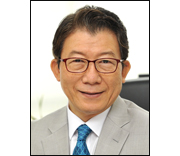-
[April 26. 2016 Korea times] Honest policies generate more jobs
- Date : 2016.05.09
- Views : 430
제목입력
 |
By Jeffrey I. Kim
The results of Korea's April 13 general elections have taken the world by surprise. Polls ahead of the election had indicated that the ruling party was on course to secure a substantial majority of seats in the national assembly. But that was not true. The seemingly left-wing opposition Minjoo Party of Korea (MPK) defeated the ruling party by one seat. Critics say that Korea will experience "a hung parliament" which means that no single political party has an absolute majority of seats.
The ruling conservative Saenuri Party won 122 out of 300 seats while the opposition MPK took 123 seats and the centrist People's Party gained 30 seats. In votes for party lists, however, MPK came third behind Saenuri Party in first place and the new People's Party in second.
The people on the conservative side are concerned that the Korean economy has a bumpy road lying ahead. Their concern may be justified because of the presumption that under a hung parliament, or put differently under no overall control in the national assembly, the ruling party would have a great difficulty in implementing a high-growth policy because the allied opposition parties would strongly oppose it.
However, the situation can get even worse if every major political party will try to influence the citizens by proposing policies that are attractive to some people but not desirable for the country as a whole. Moreover, if party leaders try to artificially generate a political business cycle to their own benefit, the economy may immediately run into a crisis.
The concept of political business cycles developed in the 1960s. There are two types of political business cycles ― ‘Opportunistic' and ‘Partisan'. The opportunistic cycle can be generated by the gimmick of political leaders. By using the simple-minded Phillips Curve showing a negative relationship between inflation and unemployment, they take tightening and easing policies alternately.
Voters compare the economic performance of the first year and of the year right before the election. If they find that the economy has improved significantly during the cycle, they will vote for the incumbent president to be reelected.
The partisan political business cycle refers to fluctuations in macroeconomic variables over or between the electoral cycles from leaders with different policy objectives. The partisan political business cycle is induced by ideological differences among the parties. Both the opportune and partisan business cycles are theoretical concepts and are subject to empirical testing. So far the evidence for the existence of the two cycles is mixed. It varies by country. For Korea there is no significant empirical evidence supporting the two types of business cycles. The two theoretical cycles depend on the assumption that on average, people are shortsighted and their expectations irrational. This assumption may be valid for some countries but not for other countries.
Scholars who belong to the school of rational expectations refute the political business cycle theory. University of Chicago professor Robert Lucas who won the Nobel Prize in 1995 criticized the conventional model of macroeconomic policy which assumes the public's backward-looking expectations. He argued that macroeconomic policy would not be effective if the public is rational and forward-looking. Political leaders may fool some people sometimes but not all people all the time. He warned that the policy taken with the assumption that the public systematically misunderstands its own interest is likely to fail.
In deciding on investments today, investors need to decide whether tomorrow will be more or less productive than today. To make tomorrow more productive is the politicians' job. To select good and right policies is the government's job. An interesting situation is now developing. The leaders of the opposition parties give out a signal that they are changing their attitudes a bit toward economic ideology. They've started advocating business-friendly policies and structural reforms to embrace the people on the right wing.
So long as good policies are concerned, there should not be a wide gap between the ruling and opposition parties. No party should manipulate economic policies for political reasons. Good policies for Korea now are honest policies that aim to reduce unemployment, increase labor and business productivity and implement structural reforms regardless of partisan politics.
Jeffrey I. Kim is a foreign investment ombudsman, a presidentially appointed troubleshooter for investors and entrepreneurs from overseas. He earned a Ph.D. in economics at the University of Chicago and taught at the University of Colorado, Boulder, and Sungkyunkwan University.
Link : http://koreatimes.co.kr/www/news/opinon/2016/04/137_203354.html










